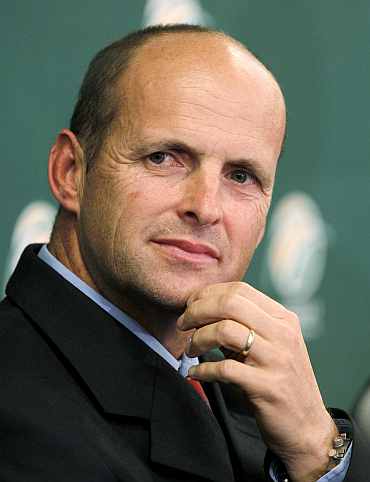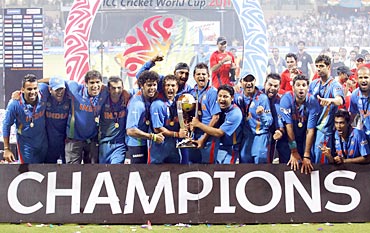 | « Back to article | Print this article |
Guru Gary reveals success mantras to India Inc
Cricket is a much revered sport in India and the cricketers are no less than gods for many. Even a child in a village would know who Mahi or Yuvi is.
But there will be many even in cities who will blabber when asked the name of the coach. Who wants to listen to the coach?
Leaders and senior managers of India Inc battled the ruthless Mumbai rains on Saturday, sitting patiently to hear 'Guru Gary' churn out his hit management mantras.
There was not an iota of intolerance visible even as the session was the last of the day and was to be followed by cocktails.
How do you handle conflicts? What should one focus more on -- short-term or long-term success? How do you handle a team that has people with individual ambitions?
Click NEXT to read on . . .
Guru Gary reveals success mantras to India Inc
Cliche questions for any management guru. But rarely has a cricket coach handled such queries on the front foot.
"We created a sense of a team, not individuals. We designed team measurable and not individual measurable. At the end of the day, we created a happy environment," said Gary Kirsten, coach of the World Cup-winning Indian cricket team.
Casually dressed in a blue and khaki combination, Gary had only a few power point slides with fewer bullet points -- a lesson in itself for the B-school graduates who pride in their knowledge of Excel and Power Point.
"We spent a lot of time on processes and not results," he said when asked how he managed the players after a defeat. "We knew that we were not going to win every game. I knew if I was too demanding then performance would drop," said the former South African player at the seminar organised by Ernst & Young.
Click NEXT to read on . . .
Guru Gary reveals success mantras to India Inc
Gary's approach has helped many players reach their full potential, a fact acknowledged by his former teammate Jonty Rhodes in Gazza -- Gary's autobiography.
Interestingly, on his study wall at home, Gary has pictures of him and his teammates scoring hundreds and shaking hands with Nelson Mandela and the Queen of England.
He has no pictures of the times when he was dismissed for a duck or when he was disappointed or angry.
Conflict management was one area that the managers of India Inc wanted to hear Gary speak on. When the team is a mixture of a legend, quite a few young hot-headed players wearing their attitude on their forehead and a cool-as-a-cucumber leader, there is bound to be conflicts.
"We had to deal with conflicts too but there were not top of the end conflict situations," he said. "We handled it behind closed doors and there were plenty of such occasions. We mediated in resolving conflicts between two players and, most importantly, it was done in the presence of both the players," said the coach whose respect could be gauged from the fact that he was carried around the ground by Indian players after winning the World Cup final.
Click NEXT to read on . . .
Guru Gary reveals success mantras to India Inc
The former cricketer who once batted for over 14 hours in a Test match said it was very important for managers to take up any new assignment with a blank sheet with no pre-conceived notions.
"I just wanted to prepare every guy . . . I came with a blank sheet. My responsibility was only to remove the self-doubts of the players," he said.
His commitment to the job was revealed when he was asked whom he would support when South Africa -- the team he is currently coaching -- and India face each other.
"As coach of India, when South Africa got knocked out (of the World Cup), I was happy. The same will apply now and I will be happy if India loses," he quipped.




